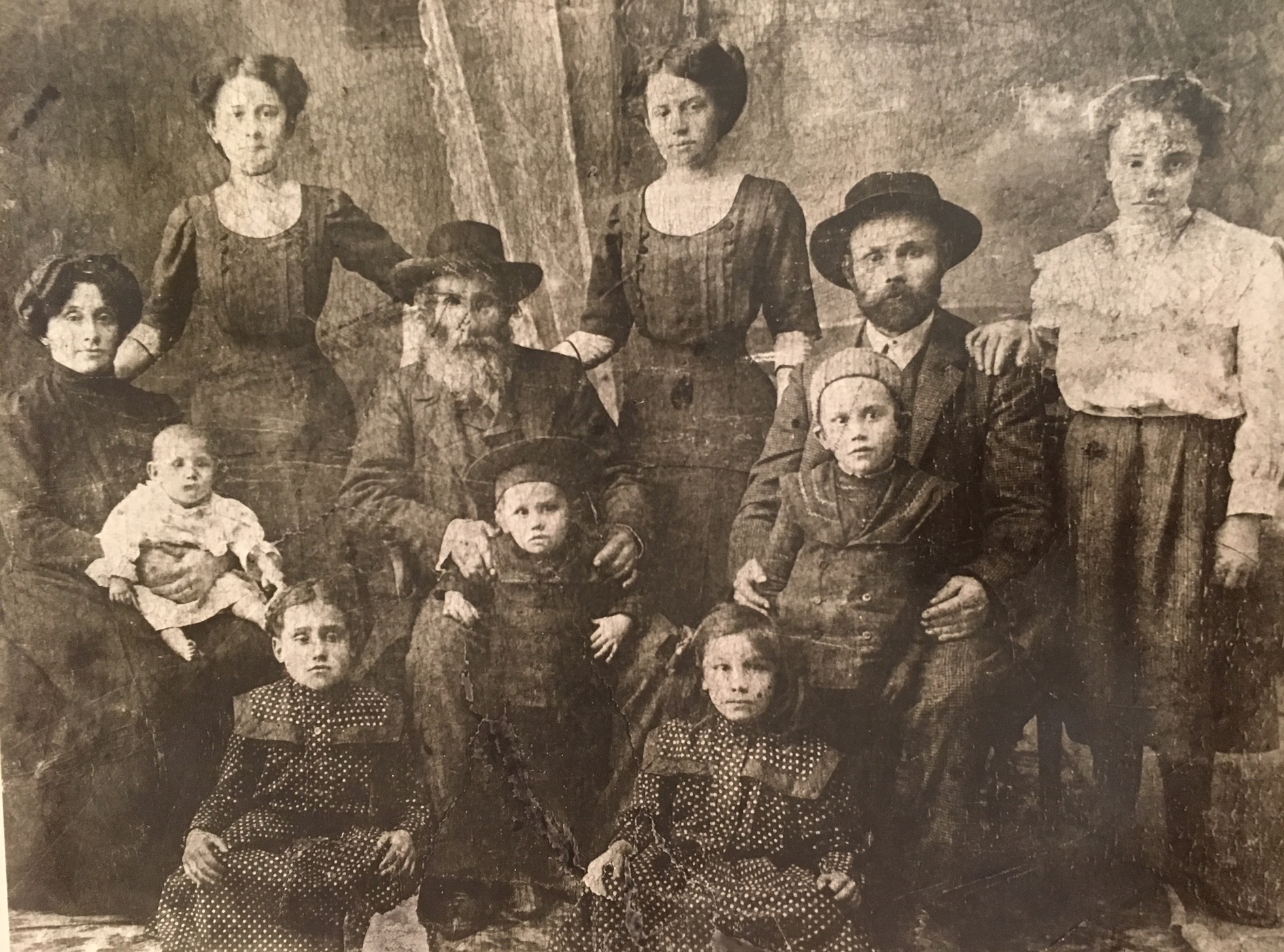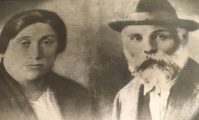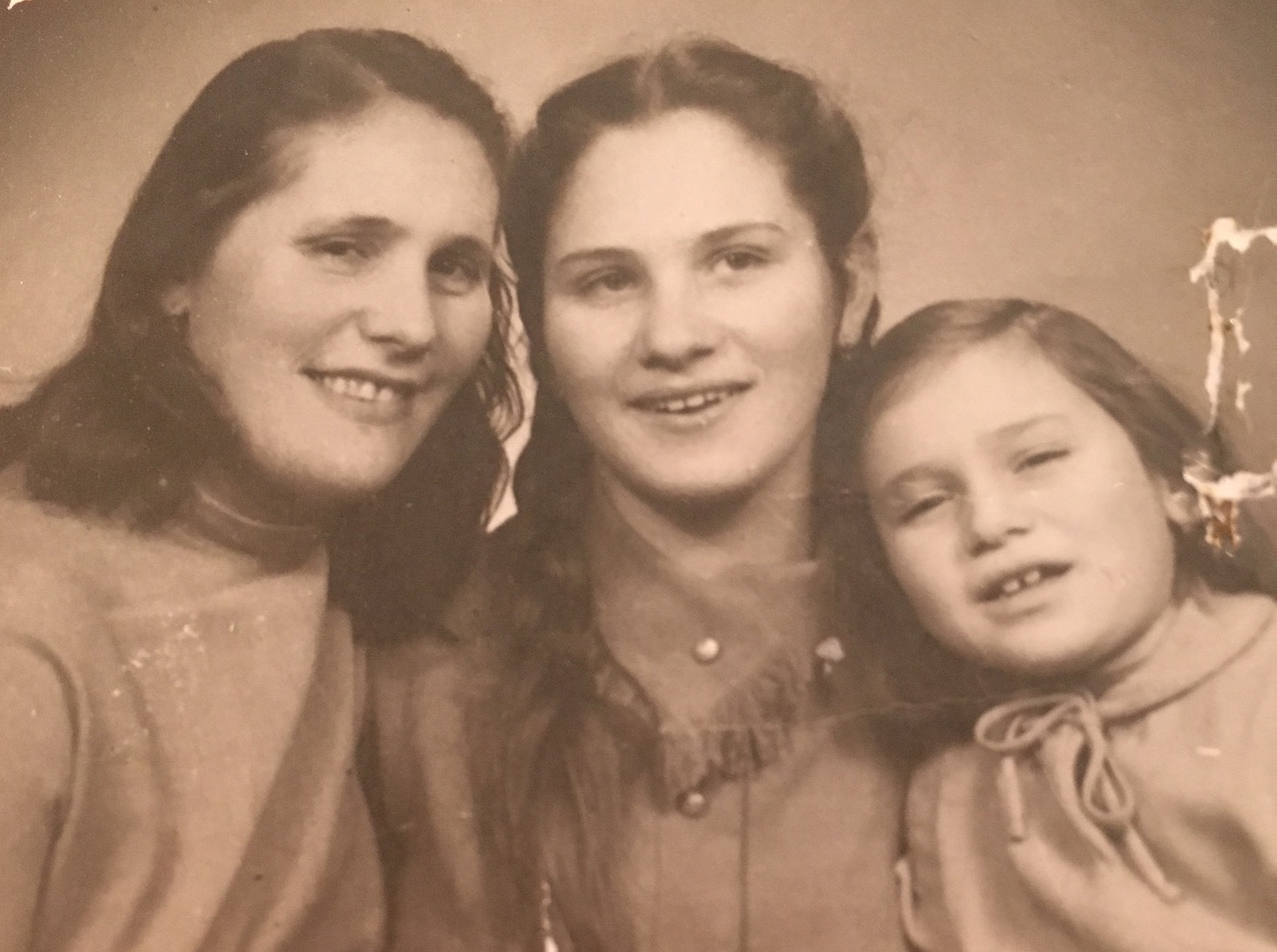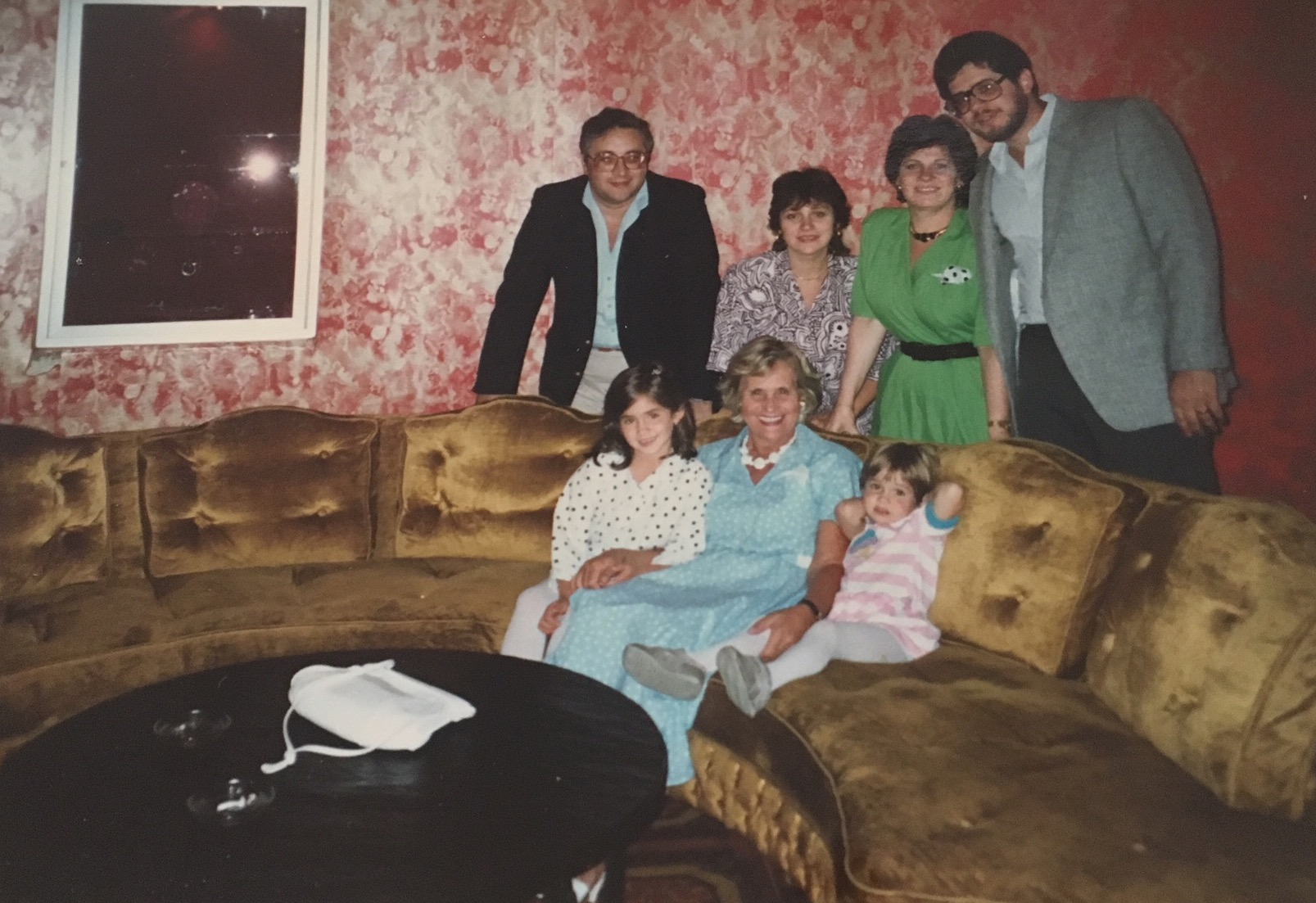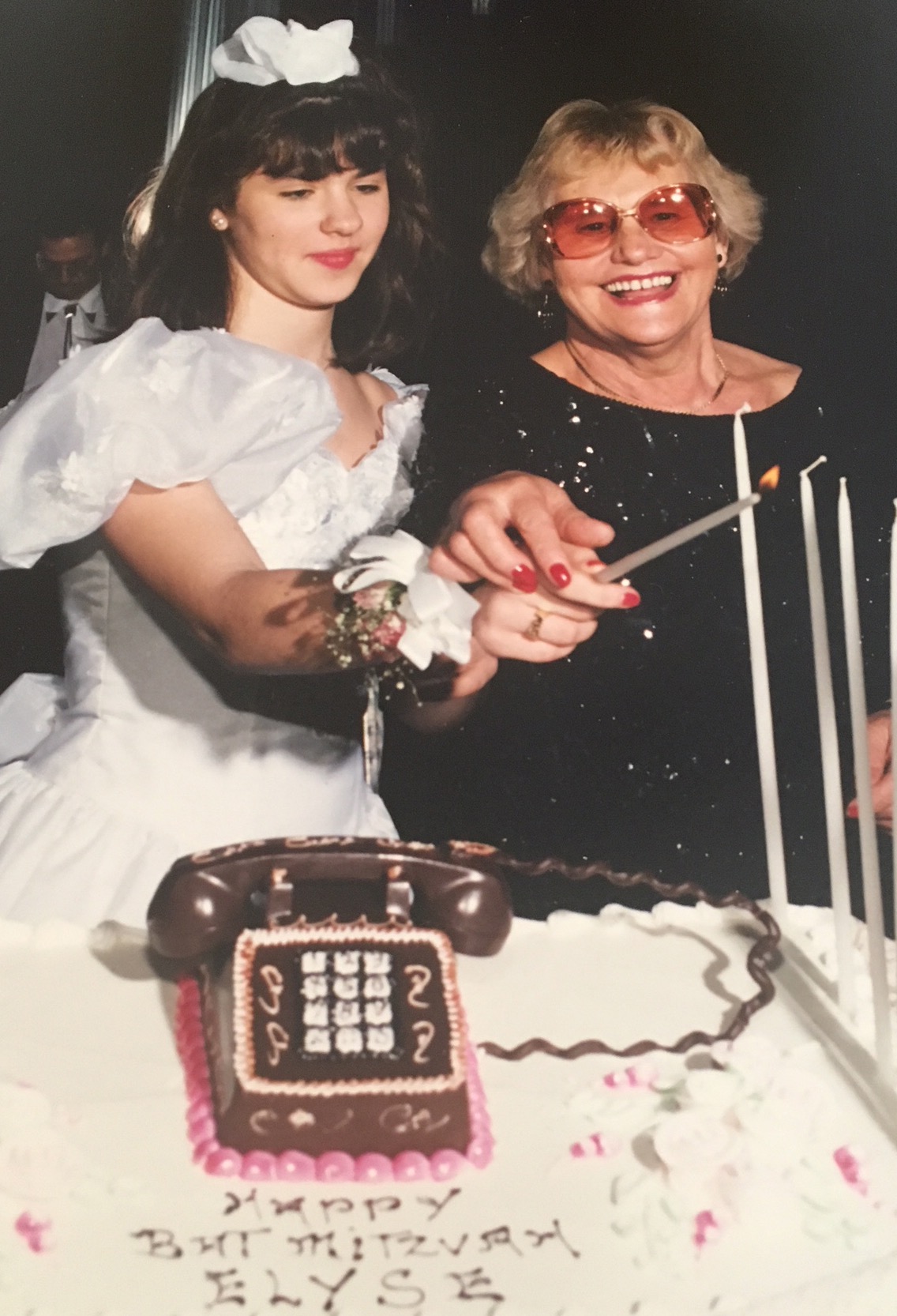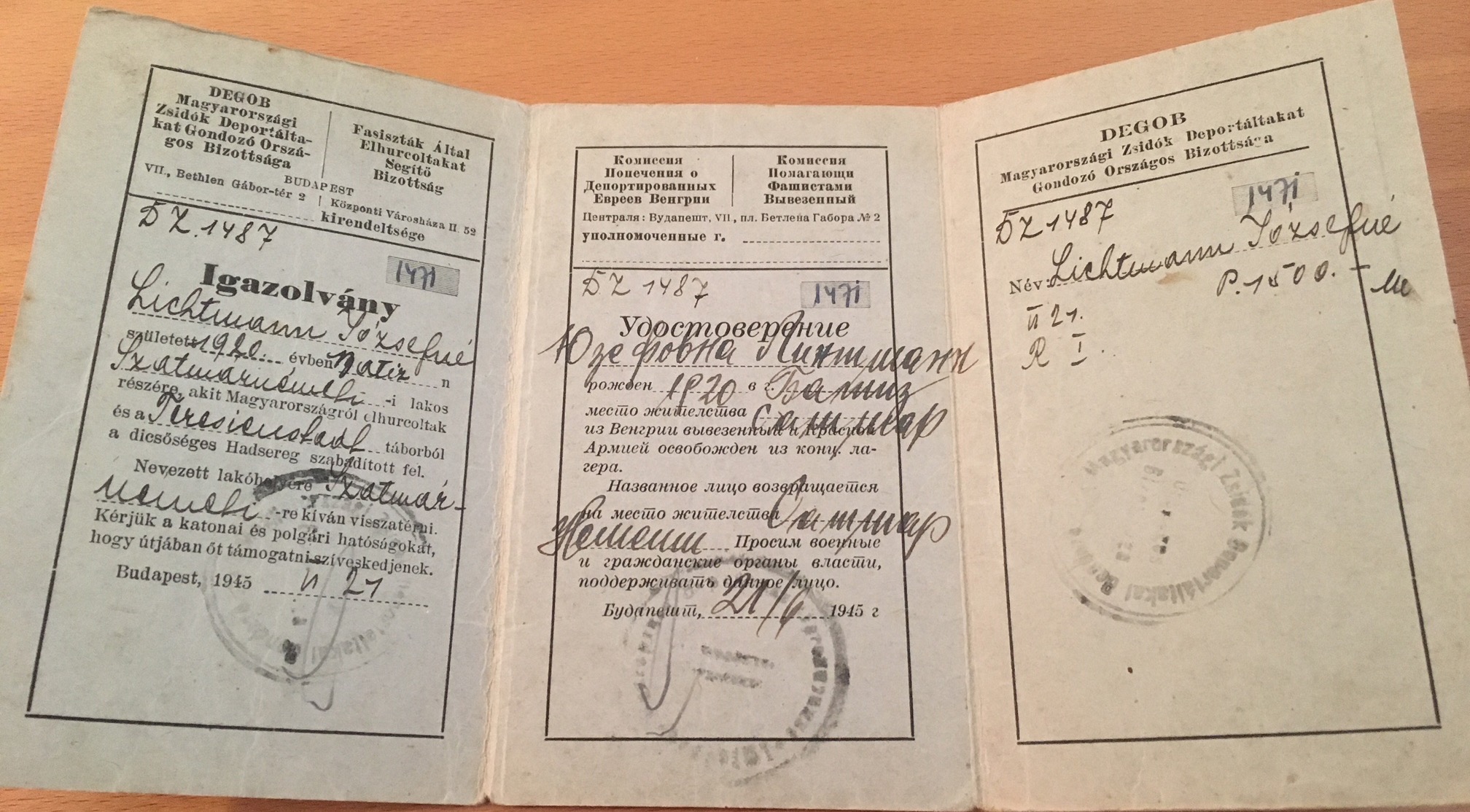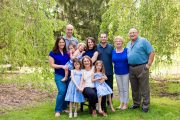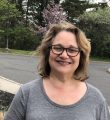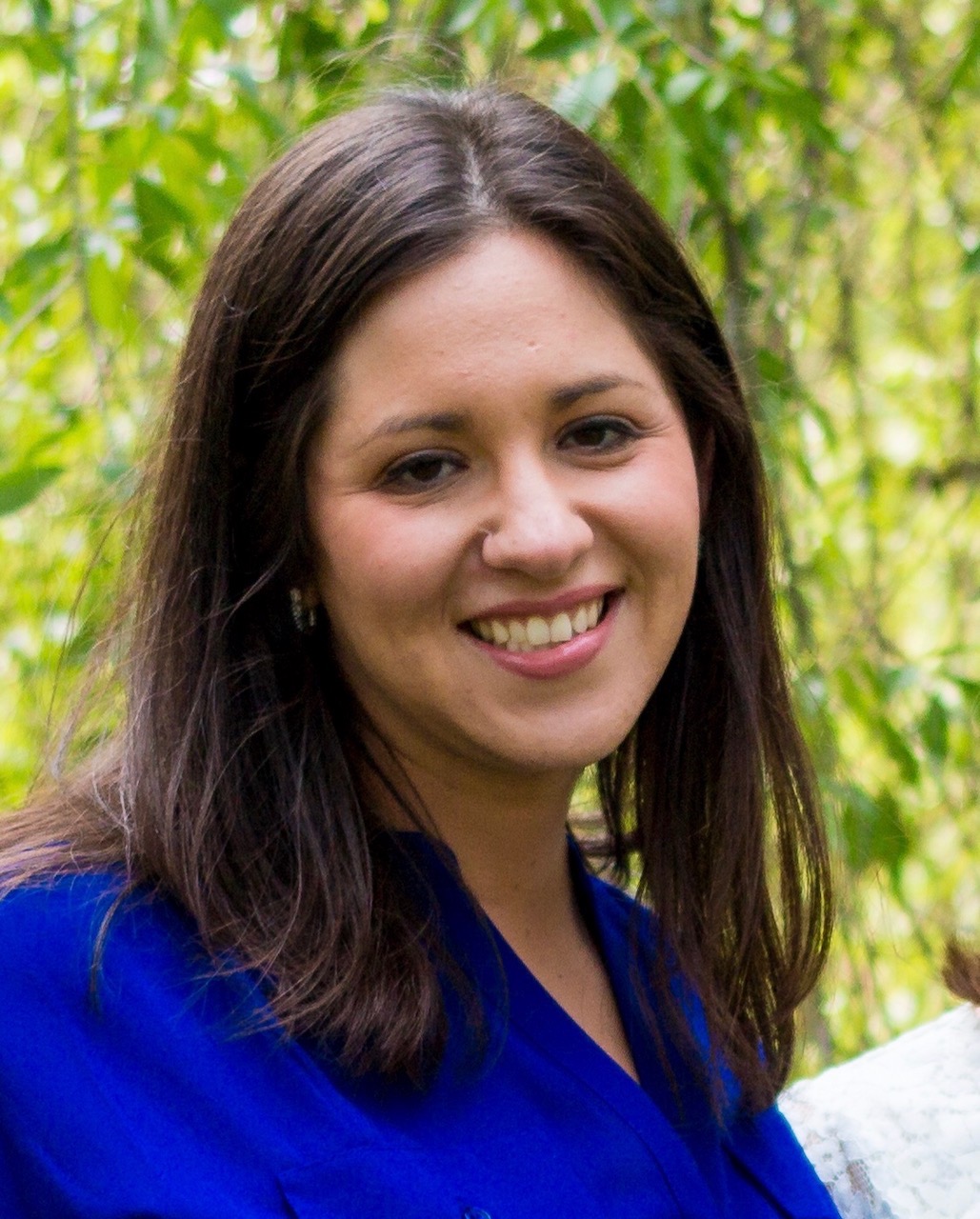- Local Survivor registry
- YOLAN LICHTMAN
- Local Survivor registry
- YOLAN LICHTMAN
Survivor Profile

YOLAN
LICHTMAN
(1918 - 1994)
PRE-WAR NAME:
YOLAN MOLDOVAN
YOLAN MOLDOVAN
PLACE OF BIRTH:
BATIZ, ROMANIA
BATIZ, ROMANIA
DATE OF BIRTH:
AUGUST 31, 1918
AUGUST 31, 1918
LOCATION(s) BEFORE THE WAR:
SATU MARE, ROMANIA (AND THEN HUNGARY)
SATU MARE, ROMANIA (AND THEN HUNGARY)
LOCATION(s) DURING THE WAR:
SATU MARE GHETTO; AUSCHWITZ; THERESIENSTADT
SATU MARE GHETTO; AUSCHWITZ; THERESIENSTADT
STATUS:
SURVIVOR
SURVIVOR
RELATED PERSON(S):
JOSEPH LICHTMAN - Spouse (Deceased),
AGGI LICHTMAN WALLACH - Daughter,
MARIE LICHTMAN FRIEDMAN - Daughter,
ELYSE WALLACH WOLFF - Granddaughter,
RACHEL WALLACH BAKER - Granddaughter
-
BIOGRAPHY BY ELYSE WALLACH WOLFF
Yolan was the tenth of eleven children born on August 31, 1918 to Hana and Vilmus Moldovan. She was born in Batiz, a mostly Jewish, small farming village right outside of Satu Mare in the region of Transylvania, which was once part of Hungary and now Romania. Yolan’s mother passed away when she was only seven years old and she was raised by her older sisters and her father. Yolan only went to school through the 3rd grade.
Yolan met her husband, Joseph Lichtman (also a survivor), in 1934 when she was only 16 and he was 21 years old. It was love at first sight, but Joseph’s mother disapproved of Yolan because her family was too poor. Despite Joseph’s mother’s disapproval, Yolan and Joseph promised themselves to each other and got engaged in 1940. However, due to Joseph having to finish forced labor and Yolan’s family wanting her to wait for her older sisters to marry before her, Yolan and Joseph did not get married until 1943. Once married, Yolan and Joseph lived in Satu Mare with Joseph’s mother in her house. It was very uncomfortable for Yolan because her mother-in-law did not approve of her, but Yolan’s remained close with her whole family who were all nearby.
When the Germans invaded Hungary, which was late in the war, Yolan and Joseph, as well as their extended families and all of the Jews in the area, were taken to the Satu Mare Ghetto. While in the ghetto, the Germans cut off Yolan’s father’s beard as a way to humiliate him in front of everyone else in the ghetto. Yolan and Joseph were only in the ghetto for a short time before it was liquidated and both were deported to Auschwitz.
Yolan arrived in Auschwitz in 1944 along with her younger sister, Irene, who was sickly. Yolan knew she was pregnant when she arrived at Auschwitz, but since she wasn’t yet showing, when Mengele told all of the pregnant women to step to the side, Yolan did not and instead stayed with Irene. Most likely, all of the pregnant women were either gassed or experimented on by Mengele – a fate that Yolan thankfully avoided. Yolan had told her family about being subjected to the morning count where they would have to stand for hours regardless of the weather. One cold, rainy morning, Yolan had a miscarriage and thanks to the rain, the women around her were able to cover the blood with mud and hide the miscarriage from the SS. This is one of the only stories Yolan told about her time in Auschwitz, and it is amazing that she survived.
Yolan and her sister Irene were sent on a death march from Auschwitz to Theresienstadt. They walked for 86 hours and arrived at Theresienstadt right after the Russian Army had liberated it. Yolan did not speak about liberation, but she then returned to Satu Mare and was reunited with her husband, Joseph, as well as some family members. Of her ten siblings, only four had survived (her sister Irene who she was in the camps with and three brothers) and six of her nieces and nephews survived, some of whom were the sole survivors in their families. Yolan’s father did not survive.
Joseph wanted to go to America, but Yolan did not want to leave her family. They stayed in Satu Mare and started a new life. They had taken in one of Yolan’s nephews, Allen, who was the sole survivor in his family. Yolan and Joseph had their first daughter, Maritza (Marie), on May 16, 1946. In 1948, Yolan and Joseph, together with their daughter and Allen, decided to escape Romania, which was becoming communist as the Russians closed the borders. They were caught at the border (it is believed someone ratted them out) and they were jailed. Yolan was in a Romanian jail for 6 months.
Once out of jail, Yolan and Joseph decided to once again start their lives in Satu Mare. They had a second daughter, Agneta (Aggi), born on April 28, 1952. All of Yolan’s family that remained in the area lived close by and there were always aunts, uncles and cousins around. It was a god life that was simple. No running water or bathrooms, but they had electricity.
In 1962, as Communism and anti-Semitism were on the rise, Yolan and Joseph, together with both of their daughters and Allen, left for Israel with nothing but the clothes on their backs and boarded the Orient Express (a few belongings had been shipped ahead to Israel). The family had some jewelry that they were wearing, but when Yolan witnessed a family being taken off the train because they had hidden jewelry, Yolan removed the jewelry that she and her daughters were wearing threw everything off the train. HIAS was waiting for them in Vienna to take them to Israel, but Joseph wanted to see Paris. Joseph gave the HIAS representatives the tags for the trunks that had been shipped to Israel as proof that they intended to go to Israel. They arrived in Paris and planned to stay for a short while before going to Israel.
While in Paris, Joseph sent a telegraph to his cousin who was living in America (after being liberated from Auschwitz) and the cousin insisted that the family instead go to America. This cousin sponsored the family to go to America. The family went through physical exams in Paris, and a spot was found on Yolan’s lung, likely because she suffered from a severe case of pneumonia a year or two before leaving Romania. America would not let the family come until Yolan was cleared, so they stayed in Paris for 10 months. Yolan and Joseph both took part time jobs illegally to earn money.
The family arrived in America at LaGuardia Airport on November 8, 1962 and settled in Perth Amboy. No one else form Yolan’s family came to America (other than Allen). They had gone to Israel, Australia or Canada after leaving Romania.
On July 4, 1973, while Yolan was on her way to visit two of her brothers in Australia for the first time since they left Romania, Joseph suddenly and tragically had a heart attack and died. Yolan never made it to Australia that trip, but did get to visit her brothers in the early 1990’s.
In 1977, Yolan married a family friend from Romania with the blessing of both of her daughters. They left Perth Amboy and moved to Rego Park, Queens where a number of Romanian friends lived. Yolan’s new husband had a sudden and tragic heart attack after only 10 months of marriage. Yolan stayed in Rego Park until she died in May of 1994 of cancer. Prior to her death she visited her family in Israel a number of times and spent a lot of time in New Jersey visiting with her 2 granddaughters, Elyse and Rachel, born to Aggi. Yolan adored her granddaughters, often babysitting them, taking them shopping, baking with them and expressing her love for her family any way that she could.
Yolan did not often speak about the war or her time in the ghetto or concentration camps. She did not speak openly about it until her granddaughter asked about the numbers tattooed on her arm, to which she responded that bad people put it there. She only spoke publicly once about her experience, which was in 1993 to Elyse’s 8th grade class. She attended the ground breaking to the Holocaust Museum in DC and slowly opened up about her experiences, but then was diagnosed with cancer and passed away.
Yolan was more than a survivor. She had strength beyond belief. She endured so much pain in her life, from losing her mother at a young age, to her time in the camps to her suffering with cancer. She instilled strength, survivorship, passion and love for family, life and G-d in her family, which is something that both of her granddaughters are now passing on to their children, one of whom is named after Yolan. Her memory is a blessing.
Editor’s Notes: Aggi Wallach, Yolan’s Daughter, discovered the following poem recently while going through Yolan’s papers. The Poem is a Tribute to Satu Mare, 1946, author-poet, unknown.
Memento
No valuables, no gift, no object is this verse,
Which I write to you on your wedding…
It came to me how I should put this to paper for You
What pains my soul.
You are a sibling to the one from whose blood,
From whose heart I came…
Of whom nothing is left but me,
Writing these lines.
Her arms are no longer hugging me and
Those red lips no longer kiss me…
Those lips that uttered the words: my child.
There is no one left to call me that.
The caresses are lies, all is but interest,
That’s what I get from others…
The world inside of me is torn into two,
There is no one in whose lap I can lay my head.
I cannot bear to live without true love,
This is why I now run to YOU…
Love me! As you best can. Everything is empty!
Because I search for Her and She is nowhere.
And now I beg of you, on your wedding
To accept this verse…
Because You are the sibling of my dear Mother,
Of whom nothing – nothing at all is left.
January 1946, Szatmar (Satu-Mare)
Note: Refer to Granddaughter, Elyse Wallach Wolff’s Registy in Voices of the Descendants.
-
SURVIVOR INTERVIEW with aggi wallach, daughter
YOLAN AND JOSEPH LICHTMAN INTERVIEW
WITH AGGI WALLACH, DAUGTHER, AND
ELYSE WALLACH WOLFF, GRANDDAUGHTER
Date: May 24, 2017
Location: Residence, Martinsville, NJ
Interviewer: Nancy Gorrell
Q: Describe your mother’s family background.
Aggi: My mother, Yolan, was the 10th of 11 children and her mother passed away when my mother was only seven years old. The whole family was very religious and observant. She was born on August 31, 1918 in Batiz, a small village right outside of Satu Mare in the region of Transylvania, which was once part of Hungary and now Romania. It was farm country—mountainous and agricultural. Everybody grew their own food. There were no stores where my mother was born. There was no indoor plumbing when my parents lived there either.Q: Did your extended family live in Satu Mare as well?
Aggi: Yes. The extended family lived all together. Everybody was Jewish where we lived, but there were non-Jews in the village.Q: What about your mother’s schooling and religious life?
Aggi: My mother went through 3rd grade. She was raised by her sisters and her father. There was a synagogue in Satu Mare.Q: Describe your father’s family background.
Aggi: My father, Joseph, was the youngest of five children born on September 23, 1913, in a small village in Hungary, which is now part of the Transylvania region in Romania. I don’t know the name of the village. He was raised by his mom alone because his father was killed in WWI before my father was even born. That’s all I know.Q: What was your father’s schooling and religious life?
Aggi: My father, Joseph, had more education than my mother. The school was a Jewish school, a cheder, Jewish Day School. He went there through 6th grade. My parents had a lot of Jewish friends. It was a close-knit community.Q: Did your parents experience anti-Semitism growing up before the war?
Aggi: They never talked about anti-Semitism before the war. I guess it was just everyday life to them. Not before the war. At least they never told us.Q: How did your parents meet?
Aggi: They met when she was 16 and he was 21 years old, and they fell in love and promised themselves to each other, but my father’s mother disapproved because my mother’s family was too poor. They were engaged in 1940, and they didn’t get married for three more years, because my father had to finish forced labor. They also had to wait for all my mother’s older sisters to get married before she could get married. When all but one of my mother’s sister had married, my parents finally got married in 1943.Q: What happened when the German’s invaded Hungary?
Aggi: My parents were living in Satu Mare in Joseph’s mother’s house. It wasn’t comfortable for my mother because her mother-in-law didn’t approve of her. Then they were taken to the Satu Mare ghetto for a short period of time. As far as we know, the entire family was there. They went with the whole family. All the Jews of the town were there.Elyse: I remember my grandmother telling us the story of her father, my great-grandfather, who was taken to the ghetto and had his beard cut off in front of everybody to humiliate him. It’s the only story I remember her telling us about the ghetto.
Q: What happened to your family next?
Aggi: From there they were deported to Auschwitz. The year was 1944. They liquidated the ghetto. My mother was with one of her older sisters, Irene, in Auschwitz and then Theresienstadt where they were liberated.Q: What happened to your mother when she got to Auschwitz?
Aggi and Elyse: She knew she was pregnant when she got to Auschwitz, but she wasn’t showing. And when Mengele said that anyone who was pregnant should step aside, my mother decided not to follow his direction, and instead stayed with her sister, Irene, who was sickly. Every morning they would be subjected to the count and would have to stand for hours during the counting. One morning it was a cold rainy day and my mother had a miscarriage. Everybody took clothes off and covered it, and that’s how she survived. She told us that story, which is one of the only stories she told us about being in the camp.Q: How did your mother survive?
Aggi: The Russians were invading at the time. She was still with her sister, Irene. They had to walk for 86 hours from Auschwitz to Theresienstadt on a death march. They both survived and were liberated by the Russian Army right after getting there. My mother never talked about liberation to me.Q: What happened to your father?
Aggi: I don’t know any stories about him in Auschwitz. He never talked about it.Q: What do you know about his liberation?
Aggi: I later found out by looking at his documents that he was liberated from Dachau on May 29, 1945. He was liberated by the Americans. The Americans wanted to bring him back to the United States, but he wanted to go back to Romania to find his wife and family that survived. The Americans gave him a date to meet so he could go to the United States. He went back to Satu Mare to look for my mother and any remaining family. My mother and her sister also went back to Satu Mare to find any remaining family.Q: Who survived in your family?
Aggi: My mother got back before my father. My mother and four of her 10 siblings survived (her sister, Irene, who she had been with in the camps and 3 brothers). Her father did not survive. Six of my mother’s nieces and nephews survived, some of whom had lost their parents (my mother’s siblings). When my father came back, he found out he was the sole survivor of his family.Q: What happened when your parents reunited after the war?
Aggi: My father said, “Let’s go to America.” My mother said “I’m not leaving my sister and brothers.” So they stayed in their hometown of Satu Mare and started a new life.Q: What was post-war Romania life like?
Aggi: My father was a worker, making his living as a truck mechanic. One of my mother’s sister’s sons, Allen who was 16 when he was liberated, was the sole survivor of his family and had nobody to care for him. My parents took him in and he lived with us, becoming a member of the family. My sister was born in May 1946, and when my sister was about three years old, the Russians started closing borders and Romania was becoming Communist. So my parents decided to escape.Q: What happened to your parents living under communism?
Aggi: In 1948 they tried to get out of Romania with my sister and cousin, Allen, but someone ratted them out and they were caught at the border, and all of them were put in jail. My mother and my cousin were in jail for six months and my father was there for over a year. It was a Romanian jail. My sister was released to live with an aunt and uncle.Q: What happened to your family after they got out of the Romanian jail?
Aggi: Once they got out of jail, they started their life again. Then they had their 2nd daughter, me, and they had a good life. All my cousins lived near us, and we all grew up together. One uncle escaped to Australia after liberation and before the borders were closed. Some of my cousins that had survived the war went straight to Canada without going back to Satu Mare. I had a wonderful life growing up Satu Mare. We had electricity by that time, but there was no running water, no bathrooms, just an outhouse. It was nice and simple. The family was there—cousins and aunts were always around.Q: How was life like for you during the communist era in Romania?
Aggi: We left in 1962 when I was nine years old. Communism was on the rise and anti-Semitism followed. I never felt it until then. I was eight years old. Romania was allowing Jews to leave for Israel. We left with nothing and took the Orient Express to Paris. Allen came with us. It was winter.Q: Describe what it was like when you were leaving Romania.
Aggi: When we first boarded the Orient Express, all of a sudden a family was taken off the train because they had hidden some jewelry. We had sent two trunks of belongings ahead to go to Israel, and we had nothing with us other than some food and the jewelry we were wearing. My mother took off all of her jewelry and also my sister’s and my jewelry and threw everything off the train for fear of us getting caught. Along the way, I remember that we stopped in Vienna. My sister, Marie, and cousin, Allen, ran off the train to get bananas. They saw at the train stop; I never had one before in my life. We were on the train for three days. We made do with the food we had. HIAS was waiting for us in Vienna, but my father refused to get off the train. He wanted to see Paris. In order for us to be allowed to go to Paris, my father gave HIAS (but it could have been a different Jewish agency, I’m not sure) the tags for our trunk as proof that we intended to go to Israel. We arrived in Paris on a Saturday. There was one Jewish man who met every train. He met us and took care of us. He took us to a hotel where they were taking in refugees. We had a room, and we planned to stay for a short while and then go to Israel.Q: What happened to your plan to go to Israel?
Aggi and Elyse: My father had a cousin who went to America after he was liberated from Auschwitz. While we were in Paris, my father telegraphed his cousin telling him we’re out of Romania, and we’re going to Israel. Then his cousin insisted we go to America instead. My father’s cousin sponsored us to go to America. In Paris, we had to go through a physical exam, and they found my mother had a dot on her lung, probably because she suffered from a severe case of pneumonia a year or two before we left Romania. America would not let us come until my mother was cleared, so we stayed in Paris for ten months until she was cleared. While we were in Paris, my parents took part time jobs illegally in order to make some money.Q: How and when did you get to America?
Aggi: On Nov 8, 1962, we arrived in America at LaGuardia airport; my father’s cousin had to sponsor each of us with a job for my father, my mother and cousin, Allen, and an apartment for all of us. HIAS paid for all of our air flights. Every month my father and mother would send a check to HIAS because they were so grateful. They wanted to help bring another family over. We settled in Perth Amboy, New Jersey.Q: After emigrating, did you grow up in Perth Amboy?
Aggi: Yes, but the rest of the family went to Israel or Australia. Our family was the only ones here. My sister went to Carnegie Mellon a year and a half after we arrived in America. I started 4th grade at public school in Perth Amboy.Q: How and when did your father pass away?
Aggi: My father encouraged my mother to go to Australia to see her brothers. On July 4, 1973, my father and I drove my mother to the airport for her flight to Australia to visit her brothers. On the way back, I was driving home because my father didn’t feel well and in the car with me he had a heart attack and died. My mother never made it to Australia to see her brothers, because when she landed in California for her layover, we had a message waiting for her telling her to call and then she came home. Eventually, my mother did get to visit her brothers in Australia in the early 90s.Q: What happened to your mother after your father died?
Aggi: In 1977 my mother remarried a family friend from Romania with our blessing. She and her new husband then left Perth Amboy in 1977. She moved to Rego Park, Queens to be near a number of her friends from Romania. All her friends, survivors from Romania, were at the wedding. She had a good life in Rego Park. My mother and her new husband were getting ready to go on a trip when he had a sudden heart attack. This was after only 10 months of marriage. After that, my mother decided to stay in Rego Park with all her friends. She went to Israel a number of times to visit the family and spent a lot of time visiting us in New Jersey to see her granddaughters, Elyse and Rachel.Q: What is your relationship like now with your extended family in Israel and Australia?
Aggi: Having grown up with all of my cousins in Romania, we were very close and kept that closeness despite the distance.Aggi and Elyse: We are still close today and recently had a family reunion in Israel in May 2014. We went to a resort in the Golan Heights—63 of us from around the world. Cousin, Allen, who passed away December 2016, was the oldest and my granddaughter, Jolie, was the youngest at four months old. Jolie is named after my mother, Yolan.
Q: What was Yolan’s relationship like with her grandchildren?
Aggi: She adored her grandchildren, Elyse and Rachel, and they adored her.Elyse: She would bake with us and play with us and we had many sleepovers at her apartment in Rego Park.
Aggi: When Elyse asked her about the numbers on her arm, she said, “Bad people put it on.” The only time she ever spoke publicly about her time in the camps was to Elyse’s 8th grade class when they were learning about the Holocaust. After the ground was broken for the Holocaust Museum in DC, which mother attended, she finally began to slowly open up. She went to Elyse’s Bat Mitzvah in 1993 and passed away in May 1994 from cancer.
-
Sources and Credits:
Credits:
SSBJCC Survivor Registry Interview with Aggi Wallach and Elyse Wallach Wolff May 24, 2017 Interviewer: Nancy Gorrell; Biography by Elyse Wallach Wolff. The SSBJCC Holocaust Memorial and Education Center gratefully acknowledges donation of historic family photographs and documents by Aggi Wallach and Elyse Wallach Wolff.


